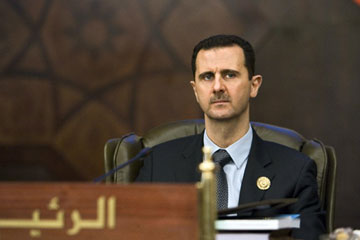
President Bashar al-Assad of Syria presides over the annual Arab summit meeting in Damascus on Saturday, March 29, 2008.
(3 of 4)
Assad's father encouraged him to be a doctor, and he chose ophthalmology--"because he couldn't stand the sight of blood," says an old school friend, a little sarcastically--and went to study at London's Western Eye Hospital. (The schoolmate, like most other Syrians interviewed for this story, spoke on the condition of anonymity for fear of a backlash from the regime or its supporters.)
Hafez's carefully laid succession plan blew up on Jan. 21, 1994, when Bassel died in a high-speed car accident while driving to Damascus airport. Bashar, after 18 months of studying in the U.K., was recalled to Damascus, and Hafez now attempted to instill in his second son, only 28, the leadership qualities he felt Syria would need. Bashar proved largely inept. "Hafez was desperate to influence and train Bashar to be a leader, but he was never the right type," says Seale. The young doctor was awkward and lacked the common touch necessary to win the loyalty of the population. "He was, still is, a terrible public speaker. He blathers on in an uncontrolled way and loses his audience quickly," says Seale.
In an attempt to prepare his new heir apparent for the presidency, Hafez asked then U.S. ambassador to Syria Ryan Crocker to help Bashar bone up on his knowledge of international affairs and diplomacy. "It was a curious way to prepare someone for leadership," Crocker remembers. "He didn't sit in on any of his father's meetings. Instead, we spoke several times for long, intense sessions." The sessions were conducted in Arabic because Assad's English wasn't as good as it is now, even though he'd just finished graduate school in London. "My understanding is he just went to school and went home and hung out with his Syrian friends at night," Crocker says. "So he could discuss eye surgeries in English, probably at a higher level than I could, but he didn't have the political and economic vocabulary."
A Disarming Dictator
When he eventually succeeded Hafez in 2000, many Syrians projected on him their hopes for change--for democratic reforms at home, for better relations with the West, for a stable and harmonious multiethnic nation in the world's most volatile neighborhood. The young Assad was thought to be more comfortable with the West than his father. After all, he had studied in Britain and had married an elegant British-Syrian banker named Asma, who would later be profiled in Vogue. He liked computers and was responsible for bringing the Internet and cell phones to Syria. He was self-effacing, even ordering the removal of posters of his father and the first family that had been ubiquitous in shops, offices and public places. He confessed to being a fan of Phil Collins and was a keen amateur photographer.
